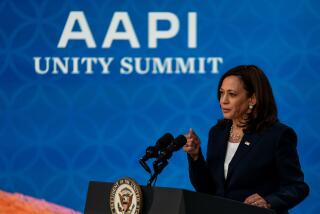In Asian View, Gore Is the Wild Card
- Share via
WASHINGTON — One of the ironies of the presidential campaign is that some foreign governments view the cautious vice president, Al Gore, as an unsettling harbinger of change and his challengers as soothing perpetuators of the status quo.
A few days ago, a senior Asian diplomat was giving a private rundown of what the four leading candidates might mean for Asia. It went like this:
George W. Bush? No problem, because he’d bring back many members of his father’s foreign policy team, with which Asia was comfortable.
John McCain? Fine. He believes in preserving America’s military presence in Asia. His strong role in the 1990s in helping to lead the way to restoring U.S. relations with Vietnam shows he isn’t focused on the past or on retribution.
Bill Bradley? Hard for Asia to find anything to complain about. He’s a free-trader. In the Senate, he was a staunch advocate of a close American relationship with Japan.
And then there’s Gore, the real question mark.
He’d probably be OK for Asia too, the diplomat thought. But there’s the worrisome question of how much Gore would feel obliged to press for labor and environmental changes overseas to maintain his base of support at home. These political necessities might lead to a tougher trade policy, one that could impinge on Asia.
A Disagreement on Several Counts
One might disagree with this particular diplomat’s analysis on several counts. Gore might, as president, turn out to be less supportive of labor and environmental issues overseas than at home. And besides, if Gore gave these issues a central role in his foreign policy, that might not be such a bad thing.
Nevertheless, the Asian diplomat’s remarks open a window into how foreign governments are viewing the current American presidential campaign: They are looking not merely at the candidates’ personalities and what they are saying but also at the larger political dynamics underlying their candidacies.
The vice president’s sober demeanor and his slow, careful speech pattern certainly don’t convey the idea that this is a guy who is eager to shake up the world. He rarely mentions he has been part of the Clinton administration--but this distancing seems to represent more a campaign tactic than any desire for policy changes.
During a lengthy interview with Times reporters and editors early this week, the vice president mentioned the “Clinton-Gore” administration only once--in a discussion of the Middle East, one place where he may derive political benefit from his association with Clinton’s foreign policy. (Maybe the foreign policy pop quiz for Gore should be, “Who’s the president of the United States?”)
Nor does Gore stake out any bold new ground on foreign policy. In fact, he seems to be making as few commitments and giving out as few specifics as possible.
Take the issue of providing missile defenses for Taiwan. During a debate in New Hampshire last week, Gore said that “some kinds of missile defense systems are well within the bounds” of America’s current relationship with China and Taiwan, while others are not.
Asked in the interview to be more specific, Gore begged off.
“Part of our success [in dealing with China and Taiwan] has been due to what’s been called constructive ambiguity,” the vice president replied. “Avoiding specifics and spelling out for either Taiwan or Beijing what we’re going to do in given circumstances is itself a factor in keeping the peace and promoting security.”
In his eagerness to avoid answers, Gore was coming up with a new phrase--actually a mishmash of two old ones. The Clinton administration has called its China policy one of “constructive engagement.” And since the era of John Foster Dulles, American officials have carried out a policy of “strategic ambiguity” to avoid spelling out in what sorts of situations the United States would go to war on Taiwan’s behalf.
But no matter. Having come up with the idea of “constructive ambiguity,” Gore, smiling, began applying it to all sorts of other policy areas too.
From the vice president’s appearance and words, it is hard to imagine what could possibly make Asian governments a trifle nervous about a Gore presidency.
Yet they are, particularly in the wake of the Clinton administration’s belated and halting support in Seattle of bringing labor and environmental issues into the World Trade Organization. And if the Democrats were to regain Congress, these Asians would be all the more uneasy.
It Works for Other Candidates, Governments
The same principle works for other candidates and other governments too.
The Europeans and the Russians seem a bit worried by Bush’s and McCain’s support for missile defense systems--not so much because of the candidates’ campaign positions but because there would be stronger pressures from within the Republican Party and in a Republican Congress to build the systems than in a Democratic administration.
This is an interesting and sophisticated way of looking at the campaign: Ask not just who the candidates are and what they say, but what they will be politically able to do or forced to do once they’re in the White House. With that new perspective, maybe Gore doesn’t quite look so staid.
Jim Mann’s column appears in this space every Wednesday.
More to Read
Get the L.A. Times Politics newsletter
Deeply reported insights into legislation, politics and policy from Sacramento, Washington and beyond. In your inbox twice per week.
You may occasionally receive promotional content from the Los Angeles Times.










